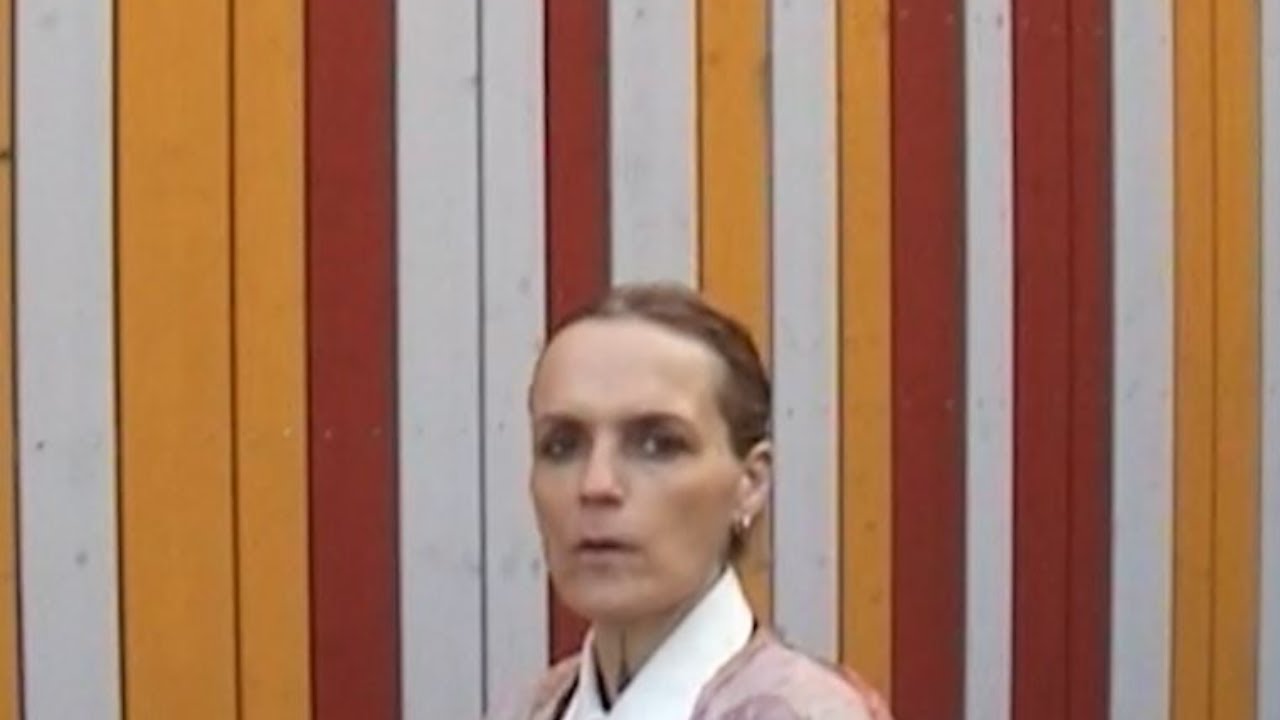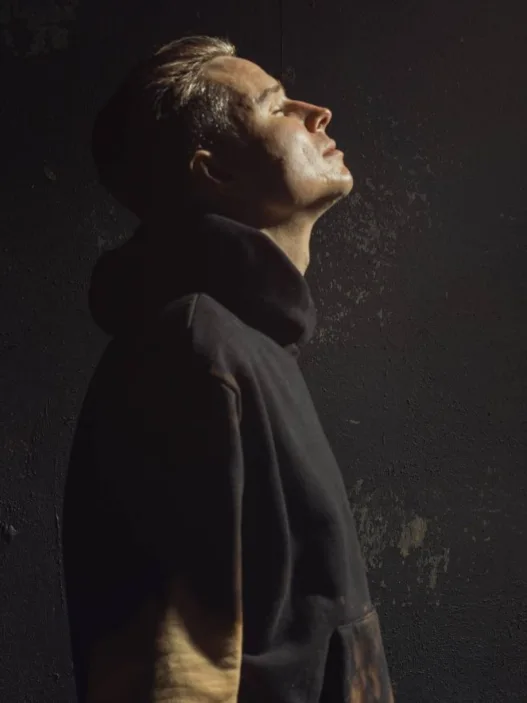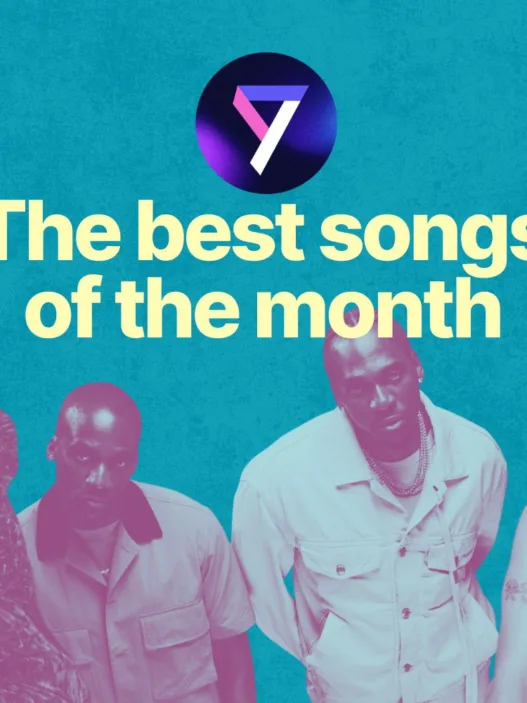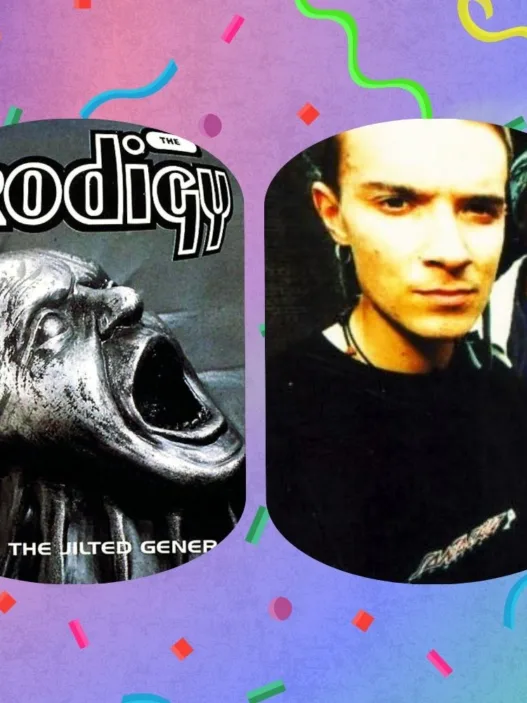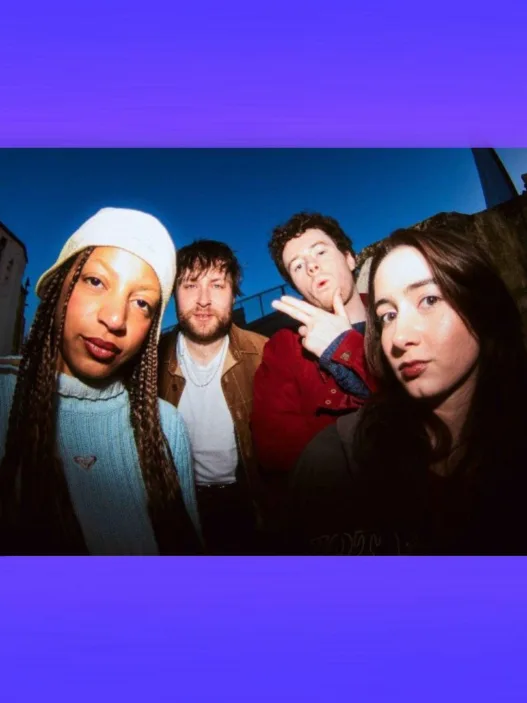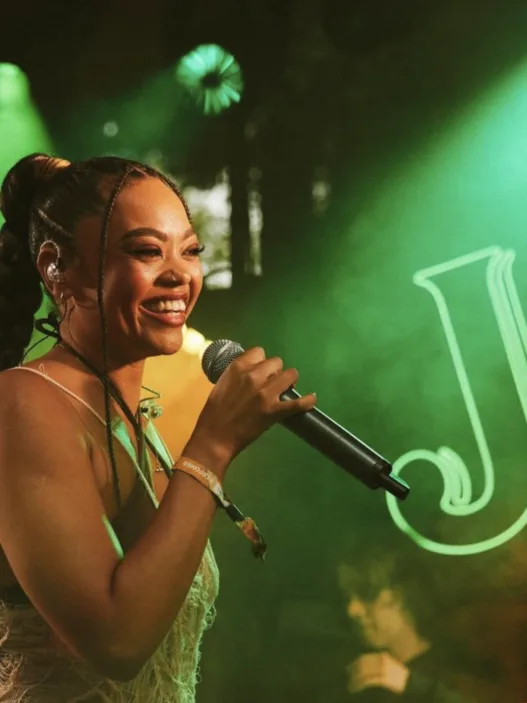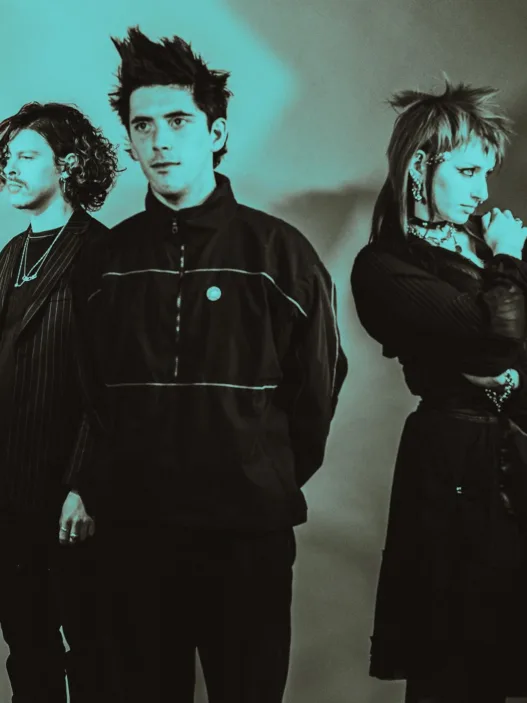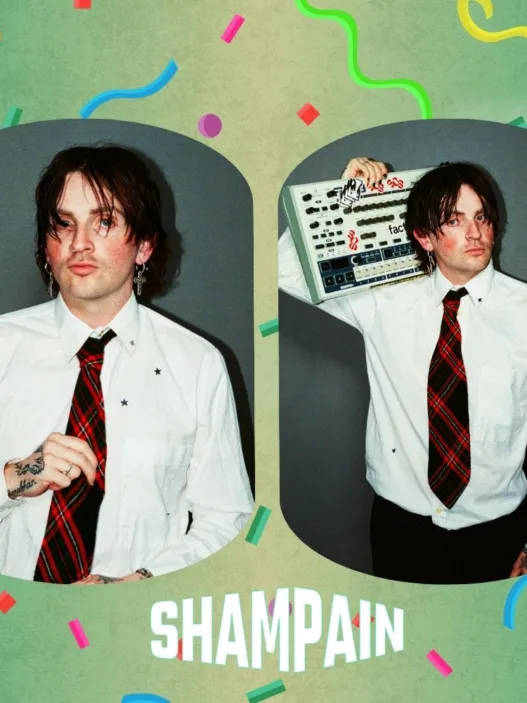Julie Fogarty’s Under Tears project is a celebration of queer love, queer ageing, and domesticity. Her first EP, produced by Jane Arnison, is called Becoming Nobody.
Watch the video by Julie and Larissa Bechtold, and read a Q&A conversation with writer Una Mullally in Berlin, they discuss the themes of her latest video release, ‘Five Days Gone’.
Una: What’s the video for Five Days Gone about?
Julie: I wrote the song about when my wife goes to Basel for work once a month. It’s about yearning, missing, longing, queer love, the mundane, just the everyday joy of being married. The video which I directed with my friend Larissa Bechtold is a celebration of just that.
It’s interesting at a time where queer love is still seen as edgy and wild, that domesticity is the flex.
I’m in my middle-aged era. I’m in my settling down era. I’ve had all those experiences you’re talking about, especially in the early years in Berlin. That’s one of the great things about being a queer person, you can experiment and explore freely with your sexuality.
Is there something radical in domesticity in your case?
Yeah! I’m radically settled!
Domesticity has always felt unattainable to me. As a queer person, you end up living on the fringes, and all of the things available to other people, you feel like you need to reject them. You don’t realise how they can be available to you in your way. I was always allergic to the concept of settling down.
I think as a queer, you’re made feel domesticity is unavailable. We’ve also been excluded from doing these things. The doors have not always been open to us; get married, have children, have the job that we want to have. Even in the music industry, it’s only now openly queer artists are being rejoiced. That of course wasn’t always the way. And there has been a lot of gatekeeping around domesticity.
Does the pursuit of domesticity not just feed into pursuing heteronormative concepts?
Yes and no. If one wants to choose that life, one should be allowed choose it. My motto used to be live and let live. But now, the older I get, I feel it in my core: allow people to do with that want, act how they want, be who they want. Let people live their best authentic lives. We’re only here for an extremely short time.
I guess most cis-straight people don’t live radical lives and are settled down from the jump.
I think queer people of a certain age settle down a lot later in life. There’s a lot of soul-searching going on before they get to that point. Let’s be honest, there’s a lot of therapy involved in there as well. Both me and you have been traumatised as children for being queer, and have hidden that fact from lots of people, or had some sort of traumatic experience growing up queer in Dublin. I always think this journey, the queer journey, is going back to your experience as a six or seven-year-old; when you wore what you wanted, when you played with the toys you wanted to play with. I learned how to play drums as an adult because I wanted to learn as a kid. As a younger person, I always wanted to be in a band, and it felt like I was never encouraged to do so. There was a lot of shame around saying ‘I want to be in a band.’ There was a sense I could never say it out loud or I’d be laughed at. I wanted a drum kit. I got piano lessons.

So you think queer ageing is about being a fully realised queer child?
Yes. The journey is getting back to the queer child. Getting back to being carefree. Not caring what anyone thinks. I played with all boys’ toys when I was a kid. I played all boys’ sports. Everything was grand and carefree, but then at a certain age you’re getting called a tom boy left, right and centre. “You look like a boy.” Then you start changing. Your appearance starts to change, you start holding yourself in a different way, you stop stomping around the place and start walking around daintily or stop sitting in a chair with your legs uncrossed. That’s really confusing for a child, because you start to feel abnormal all the time. Then puberty? Oh my god; tits, ass, hips, wha?
I think it’s about how you’re socialised. As a kid, you’re socialising yourself in a peer group. You can do a lot of whatever you want unless you have weird Victorian parents.
That’s why when we talk about queers ageing, we’re talking about going backwards, reversing into our youth with our style, how we present ourselves. There’s a freedom mentality that’s bringing us back to the youth we wanted to live and express as children but weren’t able to.
When I think of queer domesticity, I think of the legacy of lesbian living; communal living, self-sustaining, self-sufficient, women’s land. It’s not about going into a heteronormative space.
As an older dyke now, I just won’t put myself in those uncomfortable straight situations anymore. I won’t go straight bars, I won’t go to straight spaces. Dublin and Berlin are two different places though. I wasn’t able to express my sexuality in Dublin in the same way that I can in Berlin.
As a society and a city, there is a huge difference. In places that are more repressive and oppressive, that’s why queer community is so vital, especially in Ireland where the society is so square. You need your queer family even more so, because all of the expectations, pressures, norms are oppositional.
Back to what you were asking about if aiming for domesticity is a heteronormative concept. I don’t know if it is. There’s obviously the second-wave feminist concept of the personal being political, the Carol Hanisch essay. So one could see queer domesticity as a political move. It’s a radical move on some level.
I suppose before it was a conformist choice. Now it’s my choice, or your choice. If one makes those choices while removed from the culture, then it’s not a culture’s choice, or a society’s choice. Do you think that tone of comfort is coming through your artistry and your music now?
I do. The music industry is a sexist place, a misogynistic place, and it’s definitely an ageist place. I think with different projects I’ve been in over the years, there was a sense of chasing the dream. There was a naivety there. That causes struggle in trying to achieve some level of success as an artist within that framework. But around the pandemic, all of that changed. With the Under Tears project, it’s more about making something for the utter joy of being creative and making something you really love, and you don’t care who hears it. Whether ten friends buy the tape, there’s a very satisfying feeling in writing these songs. I wrote Good Drying Weather in 2020, right in the middle of the pandemic. It was really joyful, pure. Me and Jane had lovely times in the studio. That is queer. That is punk rock.
It’s all related to cutting out this notion of striving. Contentment in your practice and your artistry is about being free. You can’t be free with these stupid external pressures. I think I reject a lot of opportunities because I don’t want to compromise, and then I worry about whether that stance is deeply unhelpful. But it’s about being on your own path and not somebody else’s.
Definitely. It was stressful trying to make a success out of Evvol [Julie and Jane’s band]. But simultaneously, in our professional lives things were going quite well. And that’s nice, because then you’re making music for the pure and utter joy of it.
Doing things for the point of the creative process is very freeing. It calls to mind the Viktor Frankl quote: success, like happiness, cannot be pursued, it must ensue.
There’s a lot of truth in that.
Success is the creation.
I think the music industry has made leaps and bounds in celebrating openly queer artists now as well, and I absolutely rejoice in that. That’s the kind of music I want to listen to. Angel Olsen came out as queer in the pandemic. I’m really happy about that. I’ve always loved her as an artist, but it kind of puts her on a new level now for me. I always thought she was a bit of dyke anyway, what she was singing about! But when it’s realised, it’s great. Especially that someone at her level can feel comfortable doing that.
What’s the kind of context you’d love for people to relate to this EP?
I think with the songs I wrote, the best thing I could hope for is that someone connects with a song, or a lyric, or a mood, or it would take them somewhere, or they would resonate with it the same way I resonate with songs I listen to. Just to have that personal experience with the music – that it resonates with people and they like it. But, most importantly, that I like it first. When you’re coming from a genuine place, you’re more likely to create those connections, because you’re coming from a truthful place. It’s not contrived. This is me, some middle-aged dyke singing a few songs. If you like them, that’s great. You’re one of my peers Una. When you like the music I do, it’s like ‘great!’ I just need five or six people to like it, really. That’s enough sometimes. Really, it is. That’s the stage I’m at now. It’s about friendships that are made and kept over the years. These are really important, these connections.
Your friendship is so important to me.
I agree wholeheartedly! It’s a very important friendship.
Let’s talk about time travel again! We’ve talked a lot about queer time over the years. How can that even be explained to those who don’t exist within it?
Did you read that book by Jack Halberstam, In a Queer Times and Place? It’s great. They argue that “queer uses of time and space develop… in opposition to the institutions of family, heterosexuality, and reproduction.”
When I started reading about queer time, it just made so much sense for me, that one’s life is not marked by the same hetero-capitalist timestamps.
That Michelle Tea quote sums it up: ‘It is so hard for a queer person to become an adult. Deprived of the markers of life’s passage, they lolled about in a neverland dreamworld. They didn’t get married. They didn’t have children. They didn’t buy homes or have job-jobs. The best that could be aimed for was an academic placement and a lover who eventually tired of pansexual sport-fucking and settled down with you to raise a rescue animal in a rent-controlled apartment.’ We don’t have the same markers in life; oh I’m 20, I get married, now I’m 30, I buy a house, now I’m 40, I’m getting the lifetime job. Those markers aren’t there. That’s why I hold on to that quote because she sums it up so nicely – you end up living in a rent-controlled apartment with a rescue animal. That’s literally me and Jane! How do you explain it? Our time-markers are different, in fact, I don’t even know if they’re there. If anything, if I was to mark my time it would be about going back to a place where we were carefree and didn’t have the pressures yet of how we’re supposed to act, what we’re supposed to say, and we could genuinely be ourselves. It’s around six and seven. That age group, I was buying Star War figurines all the time. For my First Holy Communion money, I bought the Star Wars figurine of Jabba The Hut. That’s what I spent my Communion money on, and I was delighted with myself. Later on in life, I was shamed so much for playing with boys’ toys, I used to tell my friends they were my brother’s toys – ‘they’re not mine, they’re John’s’.
I had a subscriptions to a dinosaur magazine and a rock and gemstone magazine.
So cool!
I remember being so upset one year because I got a Barbie as a gift. I was so devastated. It was a moment where the world was telling me that I had to be somebody I wasn’t. That’s hard as a kid.
It’s so traumatic it sets us on completely different life courses. I’m sure you have your experiences, and I have mine. Just don’t have kids! Parents fuck kids up. It’s no one’s fault, but the story is familiar amongst queer people of our age. I always feel people who come to Berlin are always escaping something. Some are trying to find themselves, and the city allows for that, but it can also eat you up. The power of those early experiences though, it can send you on a different trajectory. Would my life or your life have turned out different if we had had different encouragement? Maybe. I don’t think I’d change anything at all about my life or my history. Is it the same for you?
Yeah, but that doesn’t mean that aspects of a history are all pleasant.
No.
You run away into destructive behaviours because you feel like you have to destroy yourself because in the context you’re in, you can’t be free.
You can’t be free.
When she was asked to define freedom, Nina Simone said: no fear.
Right. It took me ages to come out to myself. I wonder what way I might have turned out if all that language was available to me and it didn’t matter. How would everything have turned out? Would we be boring saps?! Maybe!
We had to pursue structures outside of what was assumed. Ultimately I think you’re better off exploring the unknown, you’re better off not having a map.
Yeah. I mean, in this video I’m running around Berlin in a cowboy shirt and a pair of trackies and it’s a proclamation of queer love, being free, and having a laugh. It’s simple, and I love that. It is what it is.
Becoming Nobody available now on all digital formats.
See also: ‘Ordinary Love (Jane Swims Far)’ /

Niall Byrne is the founder of the most-influential Irish music site Nialler9, where he has been writing about music since 2005 . He is the co-host of the Nialler9 Podcast and has written for the Irish Times, Irish Independent, Cara Magazine, Sunday Times, Totally Dublin, Red Bull and more. Niall is a DJ, founder of Lumo Club, club promoter, event curator and producer of gigs, listening parties & events in Dublin.


